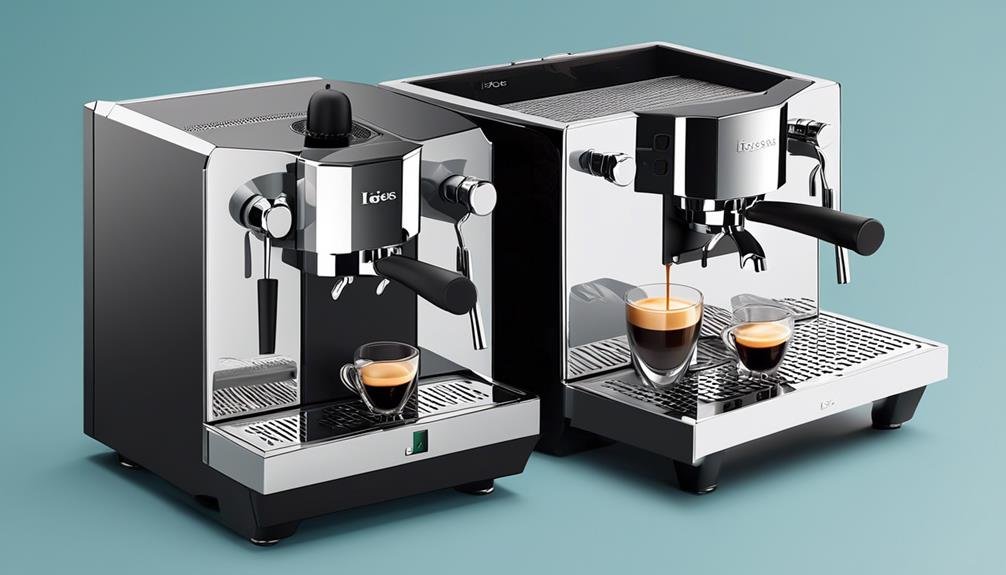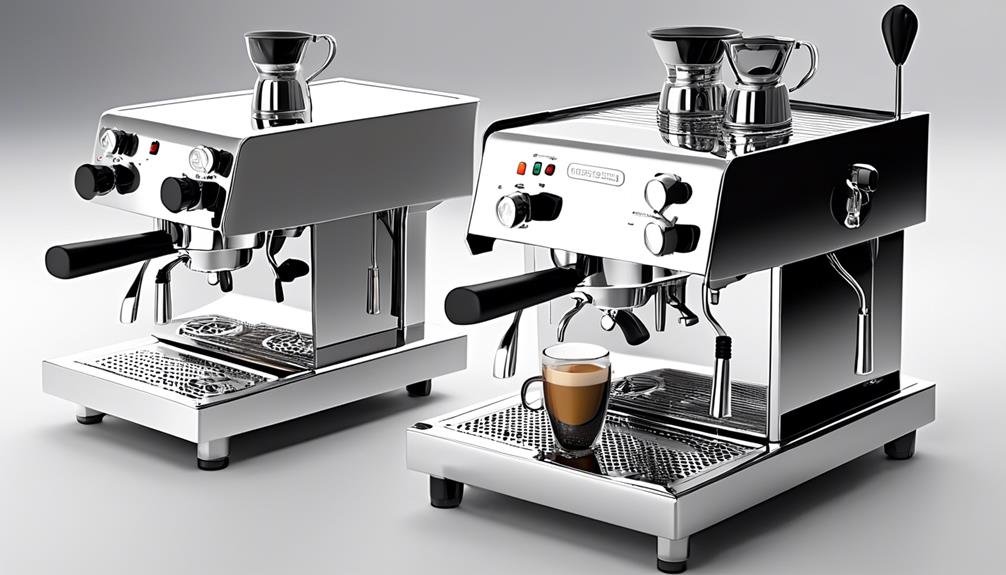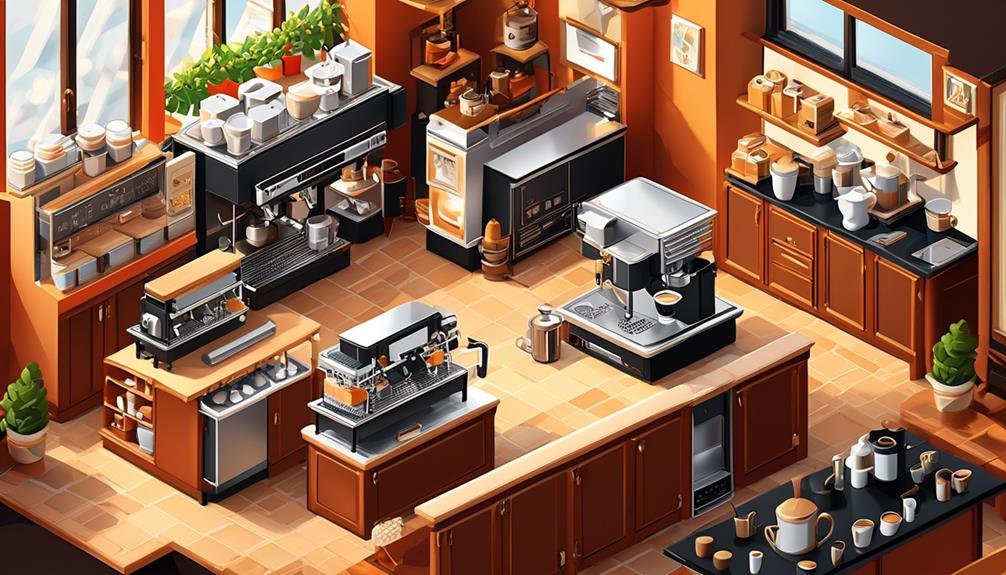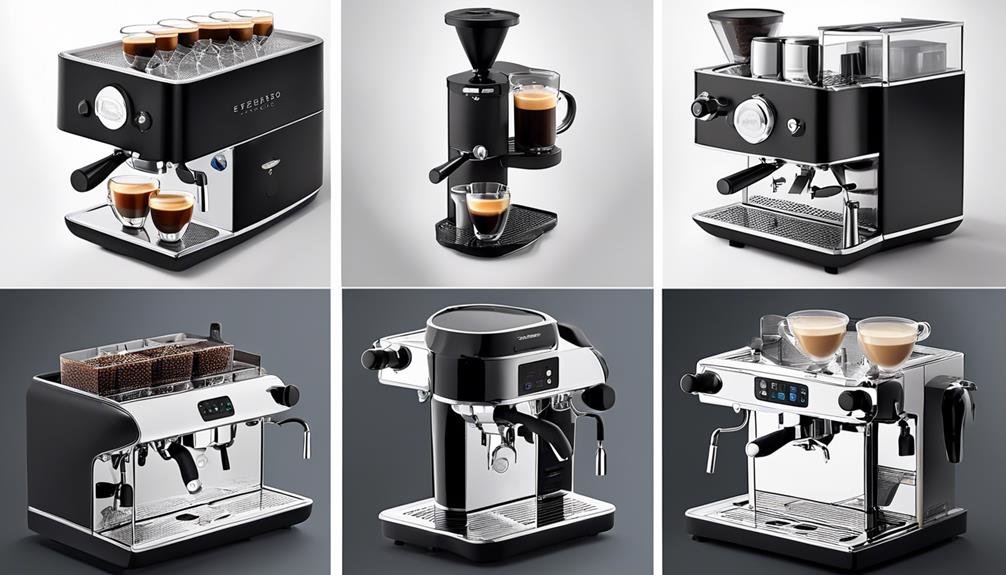Are you a coffee lover who craves that perfect cup of espresso every morning? If so, you may have wondered about the difference between a commercial and home espresso machine.
Well, get ready to dive into the world of espresso machines, where the art of brewing meets the science of design. From their size and capacity to their features and functionality, there is a lot to explore.
So, grab your favorite brew, settle in, and let's unravel the mysteries of these espresso machines together.
Key Takeaways
- Commercial espresso machines are larger, have greater storage capacity, and are made from stainless steel to withstand heavy usage and rough handling.
- Commercial machines come with multiple brewing stations, larger water tanks, and advanced features like programmable settings and temperature control.
- Commercial machines have a higher upfront cost, ranging from a few thousand to tens of thousands of dollars, while home machines are more affordable, typically ranging from a few hundred to a couple thousand dollars.
- Commercial machines offer precision temperature control, simultaneous brewing, and frothing capabilities, making them suitable for high-volume brewing and delivering consistent and high-quality coffee. Home machines, on the other hand, are better suited for smaller volumes and occasional use in a domestic setting.
Size and Capacity
When it comes to size and capacity, commercial espresso machines outshine home espresso machines in both aspects.
Commercial coffee machines are built to handle the demands of a commercial environment, while home machines are designed for average family use with low output.
The main difference lies in the size and storage capacity of the machines. Commercial coffee machines are much bigger and can store a greater amount of hot water compared to home espresso machines.
This is because commercial machines are designed to handle higher output and continuous use, whereas home machines aren't equipped for heavy usage.
Commercial coffee machines feature large boilers to support the constant demand for hot water, ensuring that the machine can keep up with the needs of a busy coffee shop or restaurant.
On the other hand, home espresso machines have smaller boilers and aren't designed for continuous use. They're better suited for occasional home use, where the demand for espresso shots is much lower.
Features and Functionality
The features and functionality of commercial espresso machines far surpass those of home machines, offering a range of advanced options for professional use. Here are some key differences in features and functionality between commercial and home espresso machines:
- Boiler Capacity: Commercial machines have larger capacity boilers, allowing for continuous brewing and handling heavy-duty usage. Home machines have standard capacity boilers, suitable for daily coffee cravings but with lower tolerance for heavy usage.
- Brewing Stations: Commercial machines often come with multiple brewing stations, enabling baristas to make several drinks simultaneously. In contrast, home machines typically have a single brewing station.
- Water Tank: Commercial machines have larger water tanks, minimizing the need for frequent refills. Home machines have smaller water tanks, requiring more frequent refilling.
Commercial espresso machines are designed to meet the demands of a busy coffee shop or restaurant, allowing for high volume brewing and efficiency. These machines often come equipped with advanced features such as programmable settings, temperature control, and pre-infusion capabilities. They're built to withstand frequent use and heavy workload.
On the other hand, home espresso machines prioritize convenience and simplicity for personal use. While they may lack some of the advanced features found in commercial machines, they still provide the ability to make quality espresso at home, satisfying the daily coffee needs of individuals or small households.
Price Range

Now let's explore the price range aspect of commercial and home espresso machines.
When it comes to price, there's a notable difference between these two types of machines. Commercial espresso machines are designed for high-volume use in cafes, restaurants, and other establishments. As a result, they generally have a higher upfront cost, ranging from a few thousand to tens of thousands of dollars. The price reflects their durability, capacity, and advanced features, such as multiple group heads for simultaneous brewing and larger boilers for continuous production.
On the other hand, home espresso machines are more affordable and suitable for personal use or small gatherings. They typically range from a few hundred to a couple thousand dollars. While they may not have the same level of durability and capacity as commercial machines, they can still produce delicious espresso drinks.
Ultimately, the price difference between commercial and home machines reflects the intended use and the level of sophistication required. So, whether you're looking to start a coffee business or enjoy espresso at home, understanding the price range is crucial in making an informed decision.
Brewing Performance
To understand the brewing performance of commercial and home espresso machines, it's important to consider their respective capabilities and features. Here are the key differences in brewing performance between commercial and home espresso machines:
- Capacity: Commercial espresso machines are designed for high-volume brewing with larger capacity boilers and multi-headed brewing stations. They can handle heavy use and brew hundreds of cups of coffee every day. On the other hand, home espresso machines have standard capacity boilers and are suitable for smaller volumes, unable to match the output of commercial machines.
- Precision and Features: Commercial machines offer precision temperature control, allowing baristas to maintain the optimal brewing conditions. They also have simultaneous brewing and frothing capabilities, enabling efficient production. Home machines, however, have limited features for brewing and may not offer the same level of precision as commercial machines.
- Quality: Commercial machines are built to deliver consistent and high-quality coffee due to their advanced features and robust construction. Home machines, while capable of producing good coffee, may not consistently achieve the same level of quality as commercial machines.
Durability and Build Quality

Considering the differences in brewing performance, let's now explore the durability and build quality of commercial and home espresso machines. Commercial machines are built to withstand the demands of a busy commercial environment, where they are constantly working and handled by multiple staff members. They have a sturdier build and are made from stainless steel, which gives them higher durability and the ability to handle rough handling. On the other hand, home espresso machines are designed for delicate handling in a home environment. They have a more delicate body and lower tolerance for heavy-duty usage. While some home machines may resemble miniature versions of commercial machines, they cannot withstand the wear and tear of a commercial environment.
To help you understand the differences more clearly, here's a table that outlines the key differences in durability and build quality between commercial and home espresso machines:
| Commercial Espresso Machines | Home Espresso Machines | |
|---|---|---|
| Durability | Made from stainless steel, designed for rough handling and high pressure | More delicate body, lower tolerance for heavy-duty usage |
| Build Quality | Sturdier build to withstand constant working and rough handling | Designed for delicate handling in a home environment |
It's important to note that home machines are not built for commercial use. Using a home machine in a commercial setting can lead to quicker wear and tear, potentially reducing its lifespan and compromising its performance. So, if you're looking for a durable and long-lasting espresso machine for a commercial setting, it's best to invest in a commercial-grade machine.
Maintenance and Cleaning Requirements
Maintenance and cleaning requirements for commercial and home espresso machines differ significantly. Here are some key differences to consider:
- Usage and Quantity: Commercial espresso machines are designed for cafes and coffee shops where they're used heavily and produce large quantities of coffee. As a result, they require more frequent and thorough cleaning to ensure optimal performance. Home machines, on the other hand, are typically used less frequently and produce smaller quantities of coffee, so their cleaning needs are less demanding.
- Build Quality and Materials: Commercial machines are built to withstand heavy use and are made from durable materials like stainless steel. They've reliable wiring and connectors that can handle the demands of a fast-paced environment. Home machines, while still of good quality, aren't designed to withstand the wear and tear of a commercial setting and may have more delicate components.
- Maintenance Regimen: Commercial machines require a more rigorous maintenance regimen, including regular backflushing, descaling, and deep cleaning. This is necessary to remove coffee residue, oils, and mineral deposits that can build up from high-volume use. Home machines, on the other hand, can be maintained with more delicate care, such as regular cleaning of the portafilter, group head, and steam wand.
Suitability for Home or Commercial Use

When deciding between a commercial or home espresso machine, it's important to consider their suitability for either a professional or relaxed setting. Commercial machines are designed to handle high-volume use in professional environments, making them ideal for businesses that serve a lot of coffee per day. These machines can produce hundreds of cups of coffee and are built with durable components to withstand constant use. They also have larger capacity boilers and require greater power input for operation.
On the other hand, home espresso machines are better suited for occasional use in a domestic environment. While they may not have the capacity or durability of commercial machines, they offer the convenience of making espresso at home without the need to spend a lot of time or money. Home machines are designed for delicate handling and have standard capacity boilers. They're also available at a smaller price point compared to commercial machines.
In terms of quality, commercial machines are known for producing higher quality espresso due to their advanced features and capabilities. However, if you're looking for a smaller, more affordable option that can still deliver a decent cup of espresso, a home machine might be the right choice for you. Additionally, home machines often require smaller water tanks, making them more suitable for smaller spaces.
Ultimately, your decision should be based on your specific needs and the environment in which the espresso machine will be used.
Frequently Asked Questions
Can You Use an at Home Espresso Machine for Business?
Yes, you can use an at-home espresso machine for business, but keep in mind that it may not withstand heavy usage or produce the same volume as a commercial machine.
What Makes an Espresso Machine Commercial?
An espresso machine is considered commercial when it is built to withstand rough handling, has a sturdier build, larger capacity boilers, multi-headed brewing stations, and is NSF certified for health and safety standards.
Does the Type of Espresso Machine Make a Difference?
Yes, the type of espresso machine makes a difference. Commercial machines are built for high-pressure, heavy use, with larger capacity and more features, while home machines are designed for daily use in a less demanding environment.
What Type of Espresso Machines Do Coffee Shops Use?
Coffee shops typically use commercial espresso machines because they are designed for high-volume, professional use. These machines have larger capacities and more advanced features, allowing them to produce large quantities of espresso drinks efficiently.
Conclusion
In conclusion, commercial and home espresso machines differ in their design, durability, capacity, and suitability for different environments.
Commercial machines are built to withstand high-volume use and rough handling in busy settings. They are designed to be durable and long-lasting, capable of producing a large number of espresso shots consistently. They often have more advanced features and settings that allow baristas to fine-tune the extraction process.
On the other hand, home machines are designed for personal use in a relaxed setting. They are typically smaller and more compact, taking up less counter space in the kitchen. Home machines may not have the same level of durability as commercial machines, as they are not expected to handle the same volume of use. However, they are still capable of producing excellent espresso shots for personal enjoyment.
When it comes to capacity, commercial machines usually have larger water tanks and boilers, allowing them to produce multiple shots of espresso quickly. Home machines, while smaller, can still produce one or two shots at a time, but may require more time between shots to heat up and be ready for use again.
Lastly, the suitability for different environments is an important consideration. Commercial machines are ideal for cafes, restaurants, and other busy establishments where espresso is a high-demand item. Home machines are better suited for individuals or small households, where the volume of espresso consumption is lower.
Overall, it's important to consider these differences when choosing the right espresso machine for your needs. Whether you're a coffee lover who wants to enjoy a quality espresso at home or a business owner looking to serve the best coffee to your customers, understanding the distinctions between commercial and home machines will help you make an informed decision.




